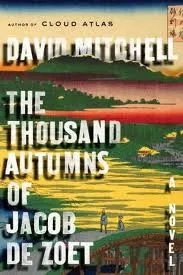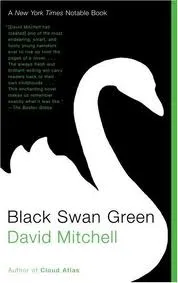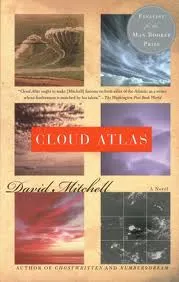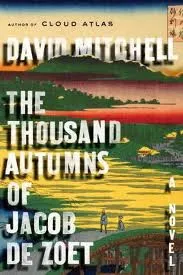
READING PATHWAYS: David Mitchell
Among the ways I’m grateful to have been introduced to David Mitchell’s novels, one is that I had no preconceptions when a friend slid Cloud Atlas across a table. The name wasn’t freighted with superlatives or comparisons, just two iambs. So I’m in favor of ignoring the hyperventilating back-cover blurbs and digging right in.
 Black Swan Green
Thirteen months in the life of a thirteen-year-old boy, a poetry-writing preteen with a stammer. Stay with me. The narrator, Jason Taylor, unspools thirteen stories of his suburban life: a fracturing family, the social landmines of school, dealing with his “Hangman” speech impediment.
There are striking flashes of language surrounding common experiences, like arcade flirting or a first shave. There’s the boy who “eeled forward” to swipe a pack of cigarettes, a girl’s “gribbly nipple,” or a father’s “ironed-in frown.” The dialogue sounds completely genuine, especially in the parents’ sniping and the kids’ boasts and threats. The Falklands War starts and Jason sponges up news and excitement; within a few pages, in a believable about-face, he parrots his sister’s more cynical take. And there are realizations that sound familiar to us but keep the freshness of thirteen: “Time in the wood’s older than time in clocks, and truer.”
Sure, there are nostalgic references to Elvis Costello and Asteroids, but this runs far deeper than, say, Big Star’s song “Thirteen.” If you enjoy the style, you’ll be primed for the Cloudburst.
Black Swan Green
Thirteen months in the life of a thirteen-year-old boy, a poetry-writing preteen with a stammer. Stay with me. The narrator, Jason Taylor, unspools thirteen stories of his suburban life: a fracturing family, the social landmines of school, dealing with his “Hangman” speech impediment.
There are striking flashes of language surrounding common experiences, like arcade flirting or a first shave. There’s the boy who “eeled forward” to swipe a pack of cigarettes, a girl’s “gribbly nipple,” or a father’s “ironed-in frown.” The dialogue sounds completely genuine, especially in the parents’ sniping and the kids’ boasts and threats. The Falklands War starts and Jason sponges up news and excitement; within a few pages, in a believable about-face, he parrots his sister’s more cynical take. And there are realizations that sound familiar to us but keep the freshness of thirteen: “Time in the wood’s older than time in clocks, and truer.”
Sure, there are nostalgic references to Elvis Costello and Asteroids, but this runs far deeper than, say, Big Star’s song “Thirteen.” If you enjoy the style, you’ll be primed for the Cloudburst.
 Cloud Atlas
A head-rushing nesting-doll of a novel. Its six stories enclose each other, moving from the past to the near-contemporary to a vividly imagined far future. I don’t think there’s any shame in reading the halves together. It’s dazzling however you experience it. Mitchell jumps from the journal of a prudish 19th-century lawyer on a Pacific voyage to the letters of a lusty 1930s composer to an interview with a cloned drone set hundreds of years from now. Black humor, chilling predictions, more than a few good intentions warped by circumstance—all galvanized by that essential storytelling hunger for what’s next.
Each tale sinks small hooks into the others, so inevitably you start looking for connections and clues. Enjoy them when you find them but you don’t need to hunt them down. “Is there such a thing as overreading?” Mitchell said in his Art of Fiction interview, claiming that of Cloud Atlas’s “echoes, eddies, and cross-references even its author possesses only an imperfect knowledge.”
How anyone thinks this book could be a film, though, is beyond me.
Cloud Atlas
A head-rushing nesting-doll of a novel. Its six stories enclose each other, moving from the past to the near-contemporary to a vividly imagined far future. I don’t think there’s any shame in reading the halves together. It’s dazzling however you experience it. Mitchell jumps from the journal of a prudish 19th-century lawyer on a Pacific voyage to the letters of a lusty 1930s composer to an interview with a cloned drone set hundreds of years from now. Black humor, chilling predictions, more than a few good intentions warped by circumstance—all galvanized by that essential storytelling hunger for what’s next.
Each tale sinks small hooks into the others, so inevitably you start looking for connections and clues. Enjoy them when you find them but you don’t need to hunt them down. “Is there such a thing as overreading?” Mitchell said in his Art of Fiction interview, claiming that of Cloud Atlas’s “echoes, eddies, and cross-references even its author possesses only an imperfect knowledge.”
How anyone thinks this book could be a film, though, is beyond me.
 The Thousand Autumns of Jacob de Zoet
By now you may be thinking, “so what’s left? Mitchell’s done everything!” Not by a long shot. His most recent work could be described as a historic novel, set in a Dutch trading post at Nagasaki, Japan, at the turn of the nineteenth century. But as a more erudite friend described it: It’s an encounter narrative, and a captivity narrative, and a transformation narrative, and a tale of suspense, and a political narrative, and a romance…
Where Cloud Atlas segments its stories, Thousand Autumns blends them. Just when you settle into the rhythm of one narrative, the plot gusts you on to the next. There are tantalizing descriptions through the eyes of the title character, a Dutch clerk. De Zoet is keenly curious about the mostly forbidden world of Japan, so he notices everything from the smell of seaweed to the sound of insects, “tick, bore, ring; drill, prick, saw, sting.” He may also beat The English Patient’s Almálsy for Most Evocative Fruit Eater. The sheer beauty of the language carries into scenes of brutality, medical procedures, and childbirth, inducing squirming admiration.
In his previous books, Mitchell carried a thread or two between novels, as well as within novels. Characters and symbols resurface like slim coins turning up in your pockets or between cushions. Sometimes it’s comforting; sometimes it’s uncanny. This novel has no overt connections to the others, but the themes of power, predation, and otherness continue to amplify. And it has one of the most poignant final sentences I’ve ever read.
____________________________
How about the other David Mitchell fans out there—what do you think? I struggled with my favorite order of Cloud Atlas or Thousand Autumns; would you have reversed them?
The Thousand Autumns of Jacob de Zoet
By now you may be thinking, “so what’s left? Mitchell’s done everything!” Not by a long shot. His most recent work could be described as a historic novel, set in a Dutch trading post at Nagasaki, Japan, at the turn of the nineteenth century. But as a more erudite friend described it: It’s an encounter narrative, and a captivity narrative, and a transformation narrative, and a tale of suspense, and a political narrative, and a romance…
Where Cloud Atlas segments its stories, Thousand Autumns blends them. Just when you settle into the rhythm of one narrative, the plot gusts you on to the next. There are tantalizing descriptions through the eyes of the title character, a Dutch clerk. De Zoet is keenly curious about the mostly forbidden world of Japan, so he notices everything from the smell of seaweed to the sound of insects, “tick, bore, ring; drill, prick, saw, sting.” He may also beat The English Patient’s Almálsy for Most Evocative Fruit Eater. The sheer beauty of the language carries into scenes of brutality, medical procedures, and childbirth, inducing squirming admiration.
In his previous books, Mitchell carried a thread or two between novels, as well as within novels. Characters and symbols resurface like slim coins turning up in your pockets or between cushions. Sometimes it’s comforting; sometimes it’s uncanny. This novel has no overt connections to the others, but the themes of power, predation, and otherness continue to amplify. And it has one of the most poignant final sentences I’ve ever read.
____________________________
How about the other David Mitchell fans out there—what do you think? I struggled with my favorite order of Cloud Atlas or Thousand Autumns; would you have reversed them?
 Black Swan Green
Thirteen months in the life of a thirteen-year-old boy, a poetry-writing preteen with a stammer. Stay with me. The narrator, Jason Taylor, unspools thirteen stories of his suburban life: a fracturing family, the social landmines of school, dealing with his “Hangman” speech impediment.
There are striking flashes of language surrounding common experiences, like arcade flirting or a first shave. There’s the boy who “eeled forward” to swipe a pack of cigarettes, a girl’s “gribbly nipple,” or a father’s “ironed-in frown.” The dialogue sounds completely genuine, especially in the parents’ sniping and the kids’ boasts and threats. The Falklands War starts and Jason sponges up news and excitement; within a few pages, in a believable about-face, he parrots his sister’s more cynical take. And there are realizations that sound familiar to us but keep the freshness of thirteen: “Time in the wood’s older than time in clocks, and truer.”
Sure, there are nostalgic references to Elvis Costello and Asteroids, but this runs far deeper than, say, Big Star’s song “Thirteen.” If you enjoy the style, you’ll be primed for the Cloudburst.
Black Swan Green
Thirteen months in the life of a thirteen-year-old boy, a poetry-writing preteen with a stammer. Stay with me. The narrator, Jason Taylor, unspools thirteen stories of his suburban life: a fracturing family, the social landmines of school, dealing with his “Hangman” speech impediment.
There are striking flashes of language surrounding common experiences, like arcade flirting or a first shave. There’s the boy who “eeled forward” to swipe a pack of cigarettes, a girl’s “gribbly nipple,” or a father’s “ironed-in frown.” The dialogue sounds completely genuine, especially in the parents’ sniping and the kids’ boasts and threats. The Falklands War starts and Jason sponges up news and excitement; within a few pages, in a believable about-face, he parrots his sister’s more cynical take. And there are realizations that sound familiar to us but keep the freshness of thirteen: “Time in the wood’s older than time in clocks, and truer.”
Sure, there are nostalgic references to Elvis Costello and Asteroids, but this runs far deeper than, say, Big Star’s song “Thirteen.” If you enjoy the style, you’ll be primed for the Cloudburst.
 Cloud Atlas
A head-rushing nesting-doll of a novel. Its six stories enclose each other, moving from the past to the near-contemporary to a vividly imagined far future. I don’t think there’s any shame in reading the halves together. It’s dazzling however you experience it. Mitchell jumps from the journal of a prudish 19th-century lawyer on a Pacific voyage to the letters of a lusty 1930s composer to an interview with a cloned drone set hundreds of years from now. Black humor, chilling predictions, more than a few good intentions warped by circumstance—all galvanized by that essential storytelling hunger for what’s next.
Each tale sinks small hooks into the others, so inevitably you start looking for connections and clues. Enjoy them when you find them but you don’t need to hunt them down. “Is there such a thing as overreading?” Mitchell said in his Art of Fiction interview, claiming that of Cloud Atlas’s “echoes, eddies, and cross-references even its author possesses only an imperfect knowledge.”
How anyone thinks this book could be a film, though, is beyond me.
Cloud Atlas
A head-rushing nesting-doll of a novel. Its six stories enclose each other, moving from the past to the near-contemporary to a vividly imagined far future. I don’t think there’s any shame in reading the halves together. It’s dazzling however you experience it. Mitchell jumps from the journal of a prudish 19th-century lawyer on a Pacific voyage to the letters of a lusty 1930s composer to an interview with a cloned drone set hundreds of years from now. Black humor, chilling predictions, more than a few good intentions warped by circumstance—all galvanized by that essential storytelling hunger for what’s next.
Each tale sinks small hooks into the others, so inevitably you start looking for connections and clues. Enjoy them when you find them but you don’t need to hunt them down. “Is there such a thing as overreading?” Mitchell said in his Art of Fiction interview, claiming that of Cloud Atlas’s “echoes, eddies, and cross-references even its author possesses only an imperfect knowledge.”
How anyone thinks this book could be a film, though, is beyond me.
 The Thousand Autumns of Jacob de Zoet
By now you may be thinking, “so what’s left? Mitchell’s done everything!” Not by a long shot. His most recent work could be described as a historic novel, set in a Dutch trading post at Nagasaki, Japan, at the turn of the nineteenth century. But as a more erudite friend described it: It’s an encounter narrative, and a captivity narrative, and a transformation narrative, and a tale of suspense, and a political narrative, and a romance…
Where Cloud Atlas segments its stories, Thousand Autumns blends them. Just when you settle into the rhythm of one narrative, the plot gusts you on to the next. There are tantalizing descriptions through the eyes of the title character, a Dutch clerk. De Zoet is keenly curious about the mostly forbidden world of Japan, so he notices everything from the smell of seaweed to the sound of insects, “tick, bore, ring; drill, prick, saw, sting.” He may also beat The English Patient’s Almálsy for Most Evocative Fruit Eater. The sheer beauty of the language carries into scenes of brutality, medical procedures, and childbirth, inducing squirming admiration.
In his previous books, Mitchell carried a thread or two between novels, as well as within novels. Characters and symbols resurface like slim coins turning up in your pockets or between cushions. Sometimes it’s comforting; sometimes it’s uncanny. This novel has no overt connections to the others, but the themes of power, predation, and otherness continue to amplify. And it has one of the most poignant final sentences I’ve ever read.
____________________________
How about the other David Mitchell fans out there—what do you think? I struggled with my favorite order of Cloud Atlas or Thousand Autumns; would you have reversed them?
The Thousand Autumns of Jacob de Zoet
By now you may be thinking, “so what’s left? Mitchell’s done everything!” Not by a long shot. His most recent work could be described as a historic novel, set in a Dutch trading post at Nagasaki, Japan, at the turn of the nineteenth century. But as a more erudite friend described it: It’s an encounter narrative, and a captivity narrative, and a transformation narrative, and a tale of suspense, and a political narrative, and a romance…
Where Cloud Atlas segments its stories, Thousand Autumns blends them. Just when you settle into the rhythm of one narrative, the plot gusts you on to the next. There are tantalizing descriptions through the eyes of the title character, a Dutch clerk. De Zoet is keenly curious about the mostly forbidden world of Japan, so he notices everything from the smell of seaweed to the sound of insects, “tick, bore, ring; drill, prick, saw, sting.” He may also beat The English Patient’s Almálsy for Most Evocative Fruit Eater. The sheer beauty of the language carries into scenes of brutality, medical procedures, and childbirth, inducing squirming admiration.
In his previous books, Mitchell carried a thread or two between novels, as well as within novels. Characters and symbols resurface like slim coins turning up in your pockets or between cushions. Sometimes it’s comforting; sometimes it’s uncanny. This novel has no overt connections to the others, but the themes of power, predation, and otherness continue to amplify. And it has one of the most poignant final sentences I’ve ever read.
____________________________
How about the other David Mitchell fans out there—what do you think? I struggled with my favorite order of Cloud Atlas or Thousand Autumns; would you have reversed them?










